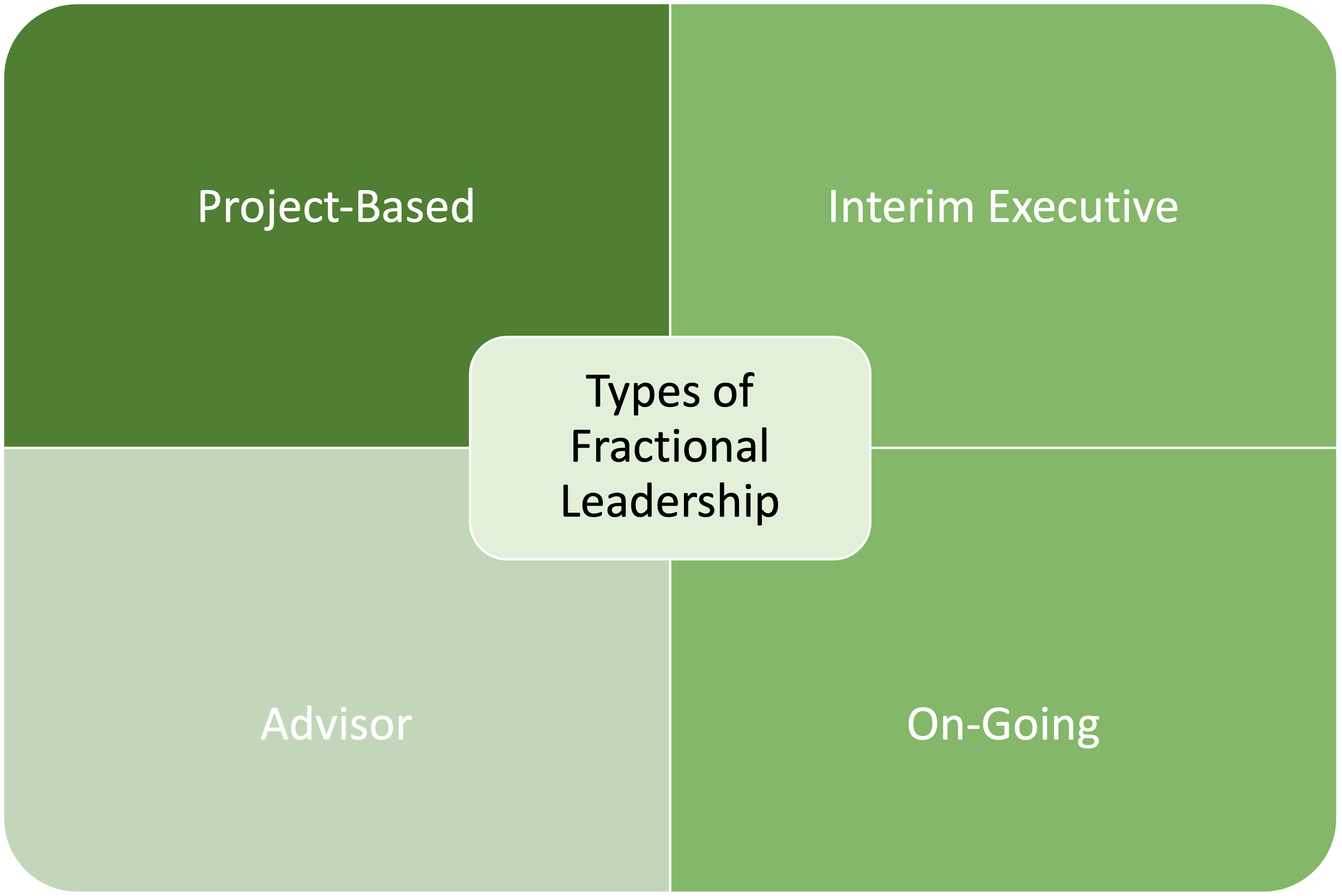
As businesses continue to evolve and adapt to market demands, traditional models of leadership are undergoing a transformation. One approach gaining traction is the use of interim executives, also known as fractional executives or fractional leadership. This innovative model offers a range of benefits, including flexibility, expert insights, and cost-effectiveness. It allows organizations to draw on specialized expertise on a part-time or project basis. Providing a valuable resource that can be tailored to specific needs.
For the fractional executive, this approach offers unprecedented flexibility in terms of working hours, days of the week, location, and duration of engagement. This allows them to tailor their work-life balance to suit their unique lifestyle requirements. While still being able to offer their expertise to businesses in need.
In this blog post, we’ll delve deeper into the concept of fractional leadership, exploring its many benefits and the selection process involved. We’ll also examine the challenges that businesses may face when implementing this approach. As well as the impact it can have on the wider organization. By the end of this post, you’ll have a comprehensive understanding of how fractional leadership can transform your business, bringing in specialized expertise on a flexible basis that can help you stay ahead of the curve.
Understanding the Fractional Leadership Model

Fractional leadership, also referred to as part-time or interim leadership, is an approach that involves engaging experienced executives or professionals on a less than full-time basis to address specific organizational leadership needs. This approach is particularly useful for organizations that require access to the expertise and skills of seasoned leaders for a limited amount of time without making the commitment of a full-time hire.
The fractional aspect of this leadership approach denotes the amount of time being committed by the leader, which can vary depending on the needs of the organization. Fractional leadership roles are typically contract-based, allowing organizations to leverage the expertise of highly skilled leaders without having to bear the full cost of a full-time hire (benefits, performance incentives, cost of living adjustments). A full-time hire also means onboarding and a period of time before this individual can contribute to the business. This approach provides organizations with flexibility, cost savings, and access to a diverse pool of leadership talent.
What is the difference between a fractional leader and a consultant?
Consultancy services are often sought by companies to enhance their processes and operations. In general, consultants are more focused on improving processes rather than providing operational support. Fractional leaders, on the other hand, are directly involved in running the business. It is worth mentioning that an experienced CEO can bring new perspectives into the organization when implementing changes. This is particularly important when it comes to growth or scaling a business, as it can be a daunting task. By implementing new technology or innovative policies, a business can breathe new life into its operations and stay ahead of the competition.
Signs that you may need a fractional executive
At times, running a business can be challenging, especially when you reach a critical point where you need to keep up with growth or tackle unique hurdles that your leadership team may not have the expertise to handle. In such scenarios, it’s essential to realize that seeking help is the first step towards success. That said, there are several signs that indicate it’s time to bring in a fractional leader to benefit your business. These signs include but are not limited to:
Hiring Restrictions
It’s mid-2023, and the economy is still not firing on all cylinders. Other companies are reducing their workforces, and your company has put a hiring freeze in place. In another scenario, you budgeted for a new team member, but the experience you require means you cannot afford to hire the candidate you need today.
Critical Business Challenge
During the pandemic, many companies saw their supply chains disrupted, whether that was a shortage of raw materials, the shutdown of overseas factories, higher shipping costs, and labor shortages. In this situation, having a fractional executive with logistics experience who has dealt with supply chain challenges, has deep connections with Chinese manufacturers, and understands the most cost-effective way to move goods when other channels are tied up would be the ideal person to help you and your team navigate this tumultuous time.
Transition and or Restructuring
In the face of significant changes within a company – whether it be the departure of a senior leader or a department being restructured – it can be incredibly helpful to have a steady and experienced hand to guide the organization through the transition. This is where a fractional leader can provide immense value. By working from outside the organization, they can offer a fresh perspective and a source of stability for those impacted by the changes. Their expertise and experience can serve as a valuable resource for individuals and teams alike, providing a sounding board for concerns and a beacon of strength during periods of uncertainty.
New Technology, System or Processes
As someone who has worked in early-stage companies, I am familiar with the process of introducing new technology, systems, or processes to a team. It can be a challenging time, requiring quick adaptation and a willingness to learn. Often, training is provided by the vendor, but there are always unexpected challenges that require further experience to overcome. When a company has the luxury of time, this process can be a valuable learning experience for all involved. However, in today’s fast-paced business world, time is often a luxury in short supply. In these cases, fractional leadership can be an excellent solution, allowing for swift execution with minimal issues.
Rapidly Growing Business
In my experience, when a company experiences rapid growth, this often leads to a surge in the size of the team. This can be a challenging time, particularly for those who lack experience, and it can put a great deal of pressure on your employees. This is where bringing in fractional leadership can be incredibly beneficial. Not only can these professionals offer guidance and support based on their extensive experience, but they can also be a source of calm during a time of rapid expansion. It’s crucial to have a team of fractional executives on board during these times, as they can provide reassurance to staff that there is someone with the necessary expertise to handle the challenges both now and in the future.
Types of Fractional Leadership

Project-Based
A project-based fractional leader is a professional who is brought in by an organization to provide leadership and expertise on a part-time basis for a specific project or initiative. This type of leader is highly specialized and focuses on a specific task, project, or area of expertise for a limited duration.
An organization may engage a project-based fractional leader for various reasons, such as launching a new product, streamlining logistics, or implementing a new software system. For instance, hiring a marketing strategist for a product launch could help ensure that the product is marketed effectively, leading to increased sales and revenue. Similarly, engaging a supply chain expert could help streamline logistics, resulting in improved efficiency and cost savings.
One of the advantages of engaging a project-based fractional leader is that the organization can benefit from targeted expertise and leadership for specific projects or initiatives without the commitment of a full-time hire. This approach is a flexible and efficient way to achieve project success while minimizing costs. Moreover, project-based fractional leaders can bring fresh perspectives and innovative ideas to the project, resulting in improved outcomes.
In conclusion, project-based fractional leaders are highly specialized professionals who offer targeted expertise and leadership for specific projects or initiatives. By engaging these leaders, organizations can achieve project success without the commitment of a full-time hire, resulting in improved outcomes and cost savings.
Interim Executives
An interim executive is a skilled and experienced professional who is appointed to temporarily fulfill a high-level executive role within an organization. These executives are typically engaged during times of transition, crisis, or transformation when an organization requires a seasoned leader to guide them through a specific period.
Interim executives bring a wealth of knowledge, expertise, and strategic guidance to the table. They offer operational leadership that enables an organization to address immediate challenges and ensure continuity until a permanent executive is hired or until the organization stabilizes. This is particularly important when a company is undergoing significant changes that could impact its stability and long-term success.
Some common roles for interim executives include interim CEO, interim CFO, interim CIO, interim HR director, and interim COO, among others. These professionals are typically highly specialized and have a deep understanding of their respective areas of expertise. As such, they are well-equipped to provide guidance and support tailored to the unique needs of each organization.
Advisor
Fractional leadership is a unique approach that involves hiring experienced and knowledgeable advisors to provide specialized guidance, insights, and strategic advice to organizations on a part-time basis. These advisors bring a wealth of expertise in specific areas and are hired to help companies make informed decisions, navigate challenges, and capitalize on opportunities without the need for a full-time commitment.
The role of fractional advisors is critical in ensuring the success of organizations. They bring a fresh perspective and an outside view to the table, enabling companies to see things from a different angle and make more informed decisions. They also bring a deep understanding of the industry, market trends, and best practices, which allows organizations to stay ahead of the curve and remain competitive.
In addition, fractional advisors are highly flexible and adaptable. They can be brought in for short-term projects or long-term engagements, depending on the needs of the organization. They also offer a cost-effective solution to companies, as they are only paid for the time and expertise they provide.
On-Going
In the realm of fractional leadership, ongoing support is a crucial component that ensures consistency and continuity in the guidance, assistance, and leadership provided by fractional executives or leaders. Unlike project-based fractional leaders who focus on specific initiatives, ongoing fractional leaders are engaged to fulfill continuous leadership roles within an organization on a part-time basis. This approach provides companies with access to experienced leadership without committing to full-time positions.
A few examples of ongoing fractional leadership roles are part-time CFOs who manage financial strategy, part-time CMOs who oversee marketing efforts, and part-time HR directors who handle human resource management. These leaders work closely with the organization’s existing leadership team to ensure a smooth transition and alignment with the organization’s goals and objectives.
Ongoing support in fractional leadership involves the consistent engagement of experienced leaders who provide continuous guidance, decision-making, and leadership within the organization while working part-time. This approach offers organizations the benefits of experienced leadership without the constraints of full-time hires, allowing them to leverage the expertise of seasoned professionals while maintaining flexibility in their hiring practices. With ongoing support from fractional leaders, organizations can achieve their objectives and stay competitive in a dynamic business landscape.
Benefits of Fractional Leadership

Expertise on Demand
Fractional leaders are typically seasoned professionals with a wealth of experience in their respective fields. They have spent their careers becoming subject matter experts in their vertical and can draw on these experiences to solve current challenges. They have strong business relationships with multiple companies that allow them to seek further guidance or assistance where required. By engaging them, organizations gain access to high-level expertise that might not be available in-house.
Cost-Effectiveness
Hiring a full-time executive comes with substantial costs, including salary, benefits, and overhead expenses. A fractional executive is someone who has left the corporate world and is looking to build their own consulting business by billing more than one client as a fractional leader. This saves both full time executives and the hiring company money and allows the individual to control their earning potential. Fractional leadership allows organizations to save on these costs while benefiting from top-tier executive talent.
Flexibility
A fractional leader offers the flexibility of being engaged for specific projects, periods of transition, or to address particular challenges. This adaptability enables organizations to tailor their leadership needs to their current requirements. As a growing business, you know you need assistance to help pave the way forward and having someone who can do the heavy lifting in specific areas will allow you to get where you need to go quicker.
Diverse Perspectives
Engaging fractional leaders from various backgrounds and industries can inject fresh perspectives into the organization. This diversity of thought can lead to innovative solutions and improved decision-making. A fractional executive allows the leadership team to use them as a sounding board where one may not have existed before. It’s the ability to share with someone who is not tied to the organization that allows for true growth in an existing leadership team or management team.
Fast Deployment
When organizations face urgent leadership gaps or opportunities, fractional leaders can be swiftly onboarded. This agility is particularly valuable during times of change or crisis.
Choosing a Fractional Executive
Now that you’ve established the why and benefits of fractional leadership, it’s time to think about how to hire and add fractional executives to your team. The search for this type of leader does not take the typical approach of posting, interviewing and hiring. In this scenario, it’s about going through an association in your industry, searching on LinkedIn, or doing a Google search for the type of fractional executive you’re looking for. Here are three factors to consider as you’re looking to bring this leader onto your team:
Experience
LinkedIn will play a vital role in understanding their experience, connections, and affiliations. Be mindful to find someone with relevant industry experience who can walk in and not have to learn the business from the bottom up. As with any hire, your team will be looking for someone they can believe will help solve the current business challenge.
Cultural Fit
Ensure you’re hiring someone who has been in a similar environment before. Hiring a former corporate executive to join a start-up may not be the right alignment. Secondally, ensure your fractional leader truly is doing this as a career and not on a part-time or side-hustle basis. Yes, they may have multiple clients but you definitely don’t want to hire someone who is working full-time and thinking they can support you after hours and on weekends.
Expectations
Before engaging with a fractional leader make sure you know what the outcome is you and your team are looking for. From here, you can set the expecation early on and ensure this individual knows what is expected of them. Documenting the deliverable with milestone dates will help both parties ensure expectations are being met.
Implementing Fractional Leadership Successfully:

Clear Objectives
Know what you want from a fractional executive and define the goal for them. You may not know the specifics of how you want this goal achieved, but knowing the outcome is critical for them to be able to build a work-back plan. Clarity will guide their strategic planning efforts and enable them to deliver targeted results.
Effective Communication
Fractional executives will vary in their preference for communication. However, it’s important a communication channel is established where you can receive regular updates and have an outlet for seeking support. Utilizing a project management tool like Basecamp may help both parties communicate and track progress and outcomes. Building a protocol will make it easier for existing team and future fractional executives to follow a process.
Cultural Alignment
Familiarize fractional leaders with the company culture. This can be achieved through orientation sessions, team-building activities, and exposure to the company’s values. It is critical to remember a fractional executive needs to embed themself within the internal resources of your company and knowing how to fit in will be a critical part of their success.
Knowledge Management
Implement processes to capture and transfer knowledge from fractional leaders to the in-house team. This ensures that valuable insights are retained within the organization. A key outcome of this type of engagement is ensuring the leadership team and or management team have the learnings to be able to apply for themselves in the future.
Transition Planning
Plan for the eventual transition, whether it’s the handover to an internal leader, leadership team. Knowing that the fractional executive will see a project through to the end means you and the team need to be prepared for when they leave.
Conclusion
Fractional leadership is a transformative approach that addresses the evolving needs of modern businesses. By leveraging the expertise of experienced professionals on a part-time basis, organizations can access specialized skills, enhance flexibility, and reduce costs. While challenges like cultural integration and communication need to be managed, a well-implemented fractional leadership model can yield substantial benefits and empower organizations to thrive in an ever-changing business landscape.


